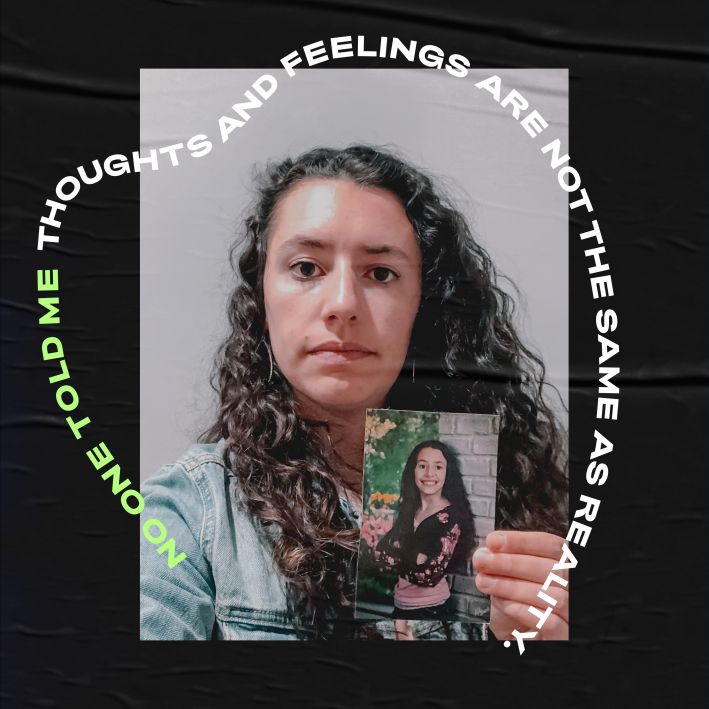No One Told Me Thoughts and Feelings Are Not the Same As Reality
Obsessive-compulsive disorder affects 1 in 50 people. Why did I have to find out about it from a Google search?
Escrito por Elise Petronzio

01 Elise’s OCD doesn’t involve hand washing or color coding. She experiences intrusive thoughts that have shifted in theme over time.
02 Worried about what would happen if she told her therapist, Elise stayed silent about the thoughts she was having.
03 It wasn’t until she found an online forum that she felt safe to speak up. She wants people to hear her story and know they aren’t the only ones going through this.
All over the internet, you see colorful quotes from inspirational pages:
“You are what you think.”
“Your thoughts create your reality.”
“Your life is a reflection of your thoughts.”
If I am my thoughts, then we BOTH might be in trouble.
What happens when your thoughts are about you jumping out of moving cars? Running people over while driving? Cheating on your significant other? I don’t mean thinking these things once and moving on with your day. What if I think about them every day as soon as I wake up?
I’d see those motivational quotes and panic. Did I want to do these disturbing things I thought about? What if I think something so often that it becomes my reality and I actually do it?
I’m talking about OCD.
Are you surprised? You might be. This case has no hand washing, no color coding—just thoughts and more thoughts to neutralize the first thoughts.
Intrusive thoughts are “unwanted thoughts, impulses or mental images that often cause significant anxiety, stress and impairment within an individual’s ability to function.” Learning what they are saved my life.

Dr. Phillipson Talks OCD Science, Symptoms & Treatment
Made of Millions cofounder, Aaron Harvey, talks with leading clinical psychologist, Dr. Steven Phillipson, about diagnosing and treating obsessive compulsive disorder.
You know who told me about intrusive thoughts? Google. Google told me, because people don’t talk about this in everyday life. They don’t even talk about it in school health classes. Back in 2011 when I was suffering most, I found an online forum filled with other people disturbed by their thoughts, like me.
It takes an average of 10 years for a person suffering from a psychiatric disorder to seek help. Half of which start before the age of 14.
I was luckier than many are. The first symptom that my family and I can recall was when I would ask my teacher to feel my head for a fever every day at age 6. By the time my OCD was spiraling out of control at age 10, I went to therapy. At this point, the compulsions were easily observed. The obsessions weren’t taboo, just irrational. By the third therapist, I found someone who understood that I needed to face my fears head on if I wanted to move past them. It gave me a year or two of peace.
We can’t forget that OCD is chronic, and it shape-shifts. Once you’re done with one type of content, it finds the next thing. I’ve fixated on worries about my health, being gay, jumping out of moving cars, screaming profanity in public, being with the wrong significant other, and so much more.
It almost seemed as I got older and smarter, so did the OCD. I started having intrusive thoughts about whether I wanted to kill myself. I wasn’t depressed, but the thought of it would pop into my head all the time. It eventually subsided.
A few years later though, I started having incessant thoughts about if I would intentionally hurt someone else, particularly someone I cared about. I would sleep all day just to avoid being awake and thinking. I had trouble leaving the house, but I also hated being in the house with lots of dangerous objects. I was pretty sure my life as I knew it was over, that I was the next Ted Bundy and that there was nothing that could stop it, because thoughts create your reality, and I could not stop having these thoughts.
This is when I found the online forum. This was crucial because I didn’t want to tell my therapist what I was thinking about. I was worried about what he would do. Would he call the police? When I realized other people had these thoughts and had told people but hadn’t been sent away, I was able to tell my therapist what was going on.
It’s hard for someone to help you if they don’t know what they’re helping you with. Ultimately, after his treatment, I entered a state of recovery. I relapsed quite a few times, and I’m sure I will relapse many more times in my life.
However, at least now I know I can tell people what I’m thinking about and get help. We need to talk about what is going on in our heads so that people can recognize these thoughts in themselves and get treatment.
I want people to know they’re not the only one being terrorized by this. They have a mental condition, and they have options. We all deserve to know and access those options.
About the Author
Elise Petronzio is a young woman from New Jersey with a passion for mental illness advocacy, particularly around sharing her experiences with Obsessive-Compulsive Disorder. She runs a TikTok account primarily focused on raising awareness of and building community around OCD (@elisezio). She has worked at various non-profits focused on mental health and has a bachelor's degree in psychology. She has been trying to embrace uncertainty and doubt since she was 9 years old.
Apoya nuestro trabajo
Nuestra misión es cambiar la manera en que el mundo percibe la salud mental.



















